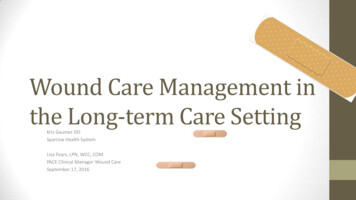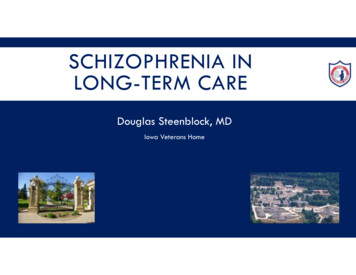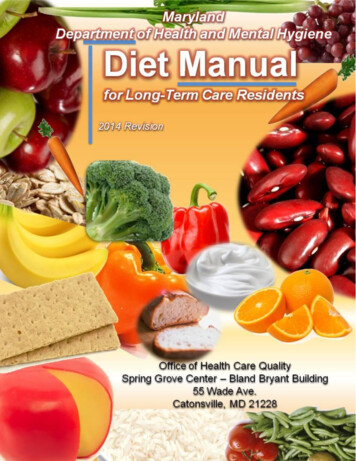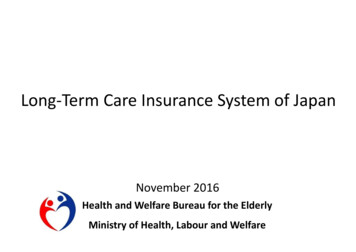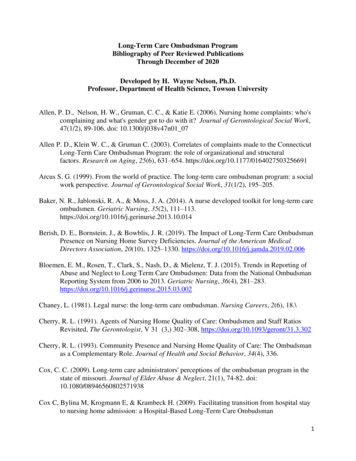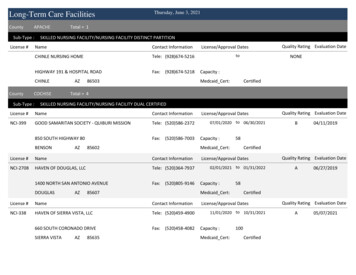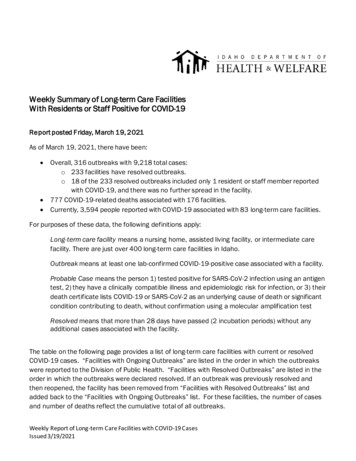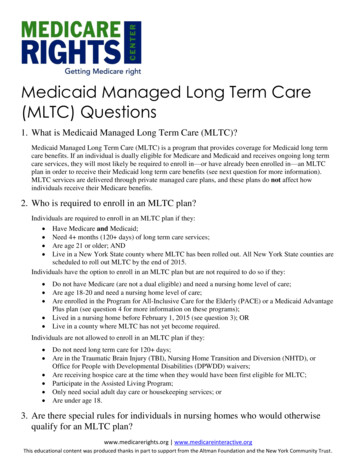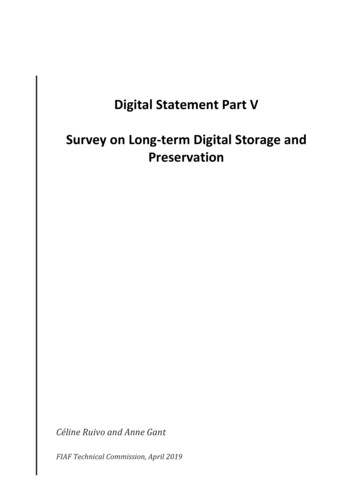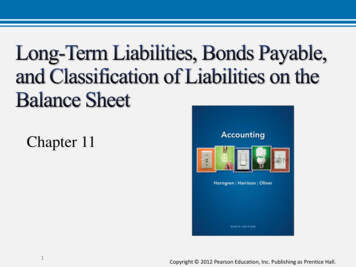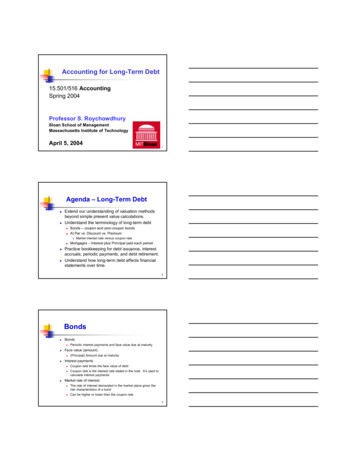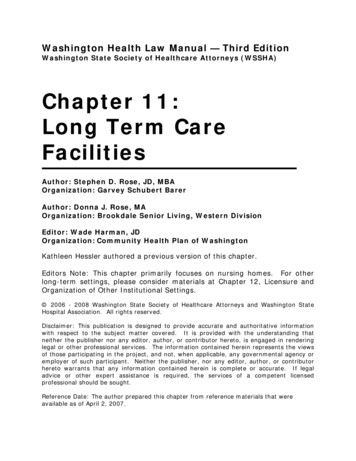
Transcription
Washington Health Law Manual — Third EditionWashington State Society of Healthcare Attorneys (WSSHA)Chapter 11:Long Term CareFacilitiesAuthor: Stephen D. Rose, JD, MBAOrganization: Garvey Schubert BarerAuthor: Donna J. Rose, MAOrganization: Brookdale Senior Living, Western DivisionEditor: Wade Harman, JDOrganization: Community Health Plan of WashingtonKathleen Hessler authored a previous version of this chapter.Editors Note: This chapter primarily focuses on nursing homes. For otherlong-term settings, please consider materials at Chapter 12, Licensure andOrganization of Other Institutional Settings. 2006 - 2008 Washington State Society of Healthcare Attorneys and Washington StateHospital Association. All rights reserved.Disclaimer: This publication is designed to provide accurate and authoritative informationwith respect to the subject matter covered. It is provided with the understanding thatneither the publisher nor any editor, author, or contributor hereto, is engaged in renderinglegal or other professional services. The information contained herein represents the viewsof those participating in the project, and not, when applicable, any governmental agency oremployer of such participant. Neither the publisher, nor any editor, author, or contributorhereto warrants that any information contained herein is complete or accurate. If legaladvice or other expert assistance is required, the services of a competent licensedprofessional should be sought.Reference Date: The author prepared this chapter from reference materials that wereavailable as of April 2, 2007.
BiographiesStephen D. Rose, AuthorStephen Rose is a healthcare partner at Garvey Schubert Barer whose practice emphasizesMedicare/Medicaid reimbursement, defending healthcare providers during governmentaudits, developing and implementing corporate compliance plans, certificate of need, andHIPAA.He is also a member of the American Health Lawyers Association and theWashington State Society of Healthcare Attorneys. Mr. Rose graduated cum laude fromWhittier University School of Law and holds a Masters Degree in Business Administration(Accounting) from Santa Clara University.Donna J. Rose, AuthorDonna Rose is the Western Division, Memory Care Specialist, for Brookdale Senior Livingand serves as the Secretary/Treasurer of the Nevada Board of Examiners for Long TermCare Administrators.She is also a Fellow of the American College of Health CareAdministrators and a member of the National Association of Long Term Care AdministratorBoards (NAB). She holds a Bachelors Degree in Therapeutic Recreation/Gerontology fromCalifornia State University, San Francisco and a Masters Degree in Management fromBrigham Young University.Wade Harman, EditorWade Harman is Vice President and General Counsel for Community Health Plan ofWashington. For much of his career, he worked as an attorney for Catholic HealthInitiatives where he served as in-house counsel for Franciscan Health System. He is amember of the American Health Lawyers Association and serves on the board of directors ofthe Washington State Society of Healthcare Attorneys. Mr. Harman graduated from theUniversity of Washington School of Law.
Chapter 11 Long Term Care Facilities(prepared from reference materials available as of April 2, 2007)Chapter Outline11.111.2Chapter Summary .11-3Nursing Facilities .11-311.2.1 Licensure .11-311.2.1.1 Requirements for License, Application11.2.1.1.1 Qualifications for Nursing Home License11.2.1.1.2 Change in Ownership11.2.1.1.3 Change in Administration or Nursing Services11.2.1.1.4 Change in Name of Nursing Home11.2.1.1.5 Denial of License, Revocation, or Nonrenewal11.2.2 Facility Physical Environment .11-611.2.2.1 Physical Environment11.2.2.1.1 Required Service Areas11.2.2.1.2 Resident Rooms11.2.2.1.3 Resident Room Requirement11.2.2.1.4 Resident Toilet and Bathing Facilities11.2.2.1.5 Dining, Dayrooms, and Resident Activity Areas11.2.2.1.6 Laundry Services11.2.2.1.7 Food Service Areas11.2.2.1.8 Lighting and Electrical11.2.2.1.9 Safety11.2.2.1.10 Water Supply11.2.2.1.11 Pest Control and Sewage and Waste Disposal11.2.3 Resident Rights .11-1211.2.3.1 Resident’s Bill of Rights11.2.3.1.1 Fee Disclosure and Deposits11.2.3.2 Medicaid Residents11.2.3.3 Other Resident Rights11.2.3.4 Notification of Changes11.2.3.5 Protection of Resident Funds11.2.3.6 Privacy and Confidentiality11.2.3.7 Grievance Rights11.2.3.8 Roommates11.2.3.9 Informed Consent11.2.3.10 Capacitated Resident/Incapacitated Resident—Decision-Making11.2.3.11 Advance Directives11.2.4 Quality of Life Issues .11-2011.2.4.1 Environment11.2.4.2 Self-determination and Participation11.2.4.3 Activities and Social Services11.2.5 Resident Assessment and Plan of Care .11-2111.2.5.1 Resident Assessment11.2.5.2 Comprehensive Plan of Care11.2.5.3 Discharge Planning11.2.6 Quality of Care . 11-2411.2.7 Nursing Services . 11-2411.2.8 Dietary Services .11-2511.2.9 Physician Services . 11-2611.2.10 Pharmacy Services . 11-2711.2.11 Infection Control .11-2811.2.12 State Inspections . 11-2811.2.12.1 Inspections11.2.12.2 Severity and Scope of Deficiencies11.2.12.2.1 Severity11.2.12.2.2 Scope of a DeficiencyWashington Health Law Manual—Third Edition11-1
Volume 2: Regulation of Healthcare Practitioners and Entities11.2.1311.2.1411.2.1511.2.1611-211.2.12.3 Plan of Correction11.2.12.4 Informal Department Review11.2.12.5 Remedies11.2.12.5.1 Mandatory Remedies11.2.12.5.2 Optional Remedies12.2.12.6 AppealsAdmission, Transfer, and Discharge . 11-3311.2.13.1 Admission11.2.13.2 Utilization Review11.2.13.3 Transfer and Discharge Rights and ProceduresResident Restraint and Abuse Issues . 11-3711.2.14.1 Resident Restraint11.2.14.2 Prevention of Abuse11.2.14.2.1 Federal Definitions11.2.14.2.2 Washington State DefinitionsCriminal History Disclosure, Background Checks and Inquiries .11-39Assisted Living Facilities and Boarding Homes . . 11-40Washington Health Law Manual—Third Edition
Chapter 11 Long Term Care Facilities(prepared from reference materials available as of April 2, 2007)11.1Chapter SummaryThe long term care industry is one of the most regulated industries in the United States. Indeed, nursing facilitiesare subject to an unusual number of both federal and state regulatory laws. Specifically, nursing facilities aresubject to a three pronged statutory mandate under the federal Omnibus Budget Reconciliation Act of 1987 (OBRA’87) 1 which has been amended numerous times by Congress.Pursuant to OBRA ’87, regulations by the Centers for Medicare & Medicaid Services (CMS) 2 are intended to“provide the impetus for Skilled Nursing Facilities (SNF’s) and Nursing Facilities (NF’s) 3 to provide moreconsistent quality care and maintain continued compliance with the new federal participation requirements.” OBRA’87 also mandates SNFs to provide care and services “to attain or maintain the highest practicable physical, mental,and psychological well-being” of each resident. 4CMS regulations setting forth the requirements of care (conditions of participation) were adopted in 1989 and1991. 5 In October of 1990, the Survey and Certification process rules became effective. 6 Finally, in November of1994, the adoption of the Survey, Certification and Enforcement regulations concluded the trilogy of OBRA ’87federal nursing home reform initiatives. The federal enforcement regulations became effective July 1, 1995 andhave been modified over the years.This chapter will provide an overview of the Washington State laws affecting nursing facilities. Washington hasspecific legislation and regulations which mirror and/or expand the federal laws. This chapter will cover the mostcommon legal issues that occur in the everyday operation of a nursing facility including, but not limited to, qualityof life issues, residents rights, resident restraints, infection control, resident abuse, and reimbursement issues.Finally, this chapter will briefly address Assisted Living Facilities (ALF’s) in the State of Washington.{Editor’s Note: For a more general overview of federal and state regulatory, compliance, operational, and financialissues, please see the Long Term Care Handbook, published by the American Health Lawyers Association.}It should be kept in mind that the focus of this Chapter is Washington State law. Federal law will be referenced asneeded, but a full discussion of federal law is beyond the scope of this Chapter.11.2Nursing Facilities11.2.1LicensureAll applications for nursing home licensure are subject to review under Chapter 97: Nursing Homes, WAC388-97-550 through WAC 388-97-600. An application for a nursing home license must be received by theDepartment of Social and Health Services (DSHS) at least 60 days in advance of the intended licensure date 7and must be renewed annually thereafter. 8 Renewals must be submitted at least 30 days prior to the expirationof the license. 9 DSHS has designated forms for the applications and renewals.1Omnibus Budget Reconciliation Act of 1987, Pub. L. 100-203, 101 Stat. 1330.2CMS was formerly known as the Health Care Financing Administration (HCFA).3Nursing homes participating in a state Medicaid Program are known as Nursing Facilities (NF’s).442 U.S.C. § 1395i-3(b)(2) (2003).5Omnibus Budget Reconciliation Act of 1987, Pub. L. 100-203, 101 Stat. 1330.6These rules were revised substantially in 1999. 42 C.F.R. Part 488.7WAC 388-97-550 (1)(a).8WAC 388-97-555 (1).9WAC 388-97-555 (2)(a).Washington Health Law Manual—Third Edition11-3
Volume 2: Regulation of Healthcare Practitioners and EntitiesThe applicant for a nursing home license must be responsible for the daily operation of the nursing home 10 andmust sign the nursing home license application or the renewal application before a notary. 11 All applicationsmust be complete before DSHS will review them. Failure to submit a completed application or to supply therequired authorizations and documentation results in DSHS refusing to review the application. 1211.2.1.1Requirements for License, ApplicationThe following is required on any application for a nursing home license. This list is not complete: 13 Name and address of the proposed licensee, and any partner, officer, director, managerial employee, orowner of five percent or more of the proposed licensee;The names of the administrator, director of nursing services, and, if applicable, the managementcompany;The specific location and the mailing address of the facility for which the license is sought;The number of beds to be licensed; andThe name and address of all nursing homes that the proposed licensee or any partner, officer, director,managerial employee, or owner of five percent or more of the proposed licensee has been affiliatedwith in the past ten years.11.2.1.1.1Qualifications for Nursing Home LicenseEach person and entity named in an application will be considered separately and jointly forlicense. If any one is unqualified, the license will be denied. 14DSHS will review the information in the application and other documents it deems relevant. Forinstance, DSHS may review survey and complaint investigation findings in each facility theapplicant (or partner, officer, director, manager, or owner of five percent or more of the applicant)has been affiliated with over the previous ten years. 1511.2.1.1.2Change in Ownership (CHOW)When a change in ownership 16 is contemplated, the current operator shall notify DSHS and allresidents and their representatives at least 60 days prior to the proposed date of transfer. 17 Thenotice to DSHS and the residents must be in writing and shall contain:18 Name of the proposed licensee;Name of the managing entity;Name, address, and telephone numbers of department personnel to whom commentsregarding the change may be directed;Names or all officers and the registered agent in the state of Washington if proposed licenseeis a corporation; andNames of all general partners if proposed licensee is a partnership.10WAC 388-97-550 (3)(a).11WAC 388-97-550 (1)(c).12WAC 388-97-560 (2) and WAC 388-97-565 (2).13WAC 388-97-550 (2).14WAC 388-97-550 (3)(b).15WAC 388-97-560 (4)(b).16See WAC 388-97-585 for definitions and/or circumstances in which DSHS considers the nursing home to have had a change inownership.17WAC 388-97-585 (3).18RCW 18.51.530 and WAC 388-97-585 (3).11-4Washington Health Law Manual—Third Edition
Chapter 11 Long Term Care Facilities(prepared from reference materials available as of April 2, 2007)The operation or ownership of a nursing home must not be transferred until the new proposedlicensee has been issued a license to operate the nursing home. 19 The new operator shall complywith all licensing requirements.11.2.1.1.3Change in Administration or Director or Nursing ServicesAny time there is a change in the administrator or the director of nursing services, the nursinghome shall notify DSHS through the Aging and Adult Services Administration (AASA) and eachresident of such changes. 2011.2.1.1.4Change in Name of Nursing HomeThe nursing home licensee must notify DSHS through AASA in writing of any change in thename of the licensee, or of the nursing home, at the time the change occurs. 2111.2.1.1.5Denial of License, Revocation, NonrenewalThe applicant and the nursing home pursuing licensure must comply with all requirementsestablished in RCW Chapters 18.51, Nursing Homes, and 74.42, Nursing Homes—Resident Care,Operating Standards, and the rules adopted thereunder. DSHS may deny, suspend, revoke, or failto renew a nursing home license to any applicant (or any partner, officer, director, manager, orowner of five percent or more of the applicant) for any of the following reasons: 22 The facility has a history of significant noncompliance with state or federal regulations inproviding nursing home care;No credit history or a poor credit history;Engaged in the illegal use of drugs or the excessive use of alcohol or been convicted of crimesrelating to drugs;Unlawfully operated a nursing home without a license or under a revoked or suspendedlicense;Previously had a license revoked or suspended for the operation of a hospital or any otherfacility for the care of children or vulnerable adults;Obtained or attempted to obtain a license by fraudulent means or misrepresentation;Permitted, aided, or abetted the commission of any illegal act on the nursing home premises;Failed to meet the financial obligations as the obligations fall due in the normal course ofbusiness;Been convicted of a felony or a crime against a person if the conviction reasonably relates tothe competency of the person to own or operate a nursing home;Convicted of a “crime against children or other persons” as defined under RCW 43.43.830;Convicted of a “crime relating to financial exploitation” as defined under RCW 43.43.830;Found by a court in a criminal proceeding or a protection proceeding under Chapter 74.34RCW, or any comparable state or federal law, to have abandoned, abused, neglected, orfinancially exploited a vulnerable adult;Found in any final decision issued by a disciplinary board to have sexually or physicallyabused or exploited any minor or any individual with a developmental disability, or to haveabused, neglected, abandoned, or financially exploited any vulnerable adult;Found in any dependency action to have sexually assaulted or exploited any minor or to havephysically abused any minor;19WAC 388-97-585 (4).20WAC 388-97-162 (4).21WAC 388-97-162 (5).22This list is not exhaustive. For a complete listing see WAC 388-97-570.Washington Health Law Manual—Third Edition11-5
Volume 2: Regulation of Healthcare Practitioners and Entities Found by a court in a domestic relations proceeding under Title 26 RCW, or any comparablestate or federal law, to have sexually abused or exploited any minor or to have physicallyabused any minor;Found to have abused, neglected, abandoned, or financially exploited or mistreated residentsor misappropriated their property, and that finding has been entered on a nursing assistantregistry;Been certified pursuant to RCW 74.20A.320 as a person who is not in compliance with achild support order (license suspension only);Failed to report abandonment, abuse, neglect, or financial exploitation of a resident;Failed to pay a civil fine DSHS assesses within ten days after the assessment becomes final;Refused to allow department representatives or agents to inspect required books, records, andfiles or portions of the nursing home premises;Willfully prevented, interfered with, or attempted to impede the work of authorized DSHSrepresentatives; orRetaliated against a resident or employee initiating a complaint with DSHS against thelicensee or participating in the investigation of the licensee by DSHS.If an applicant wishes to contest a DSHS license decision, they must file a written request for anadministrative hearing within twenty days of receipt of the decision. 23 The appeals process andrequirements are set forth in WAC 388-97-625.11.2.2Facility Physical EnvironmentFor detailed regulations regarding the physical environment and safety of nursing facilities, please refer toChapter 97: Nursing Homes, WAC 388-97-295 through WAC 388-97-480.11.2.2.1Physical EnvironmentThe design of a nursing home must facilitate resident-centered care and services in a safe, clean,comfortable and homelike environment that allows the resident to use his or her personal belongings to thegreatest extent possible. 24 The nursing home must ensure that each resident care unit is located tominimize through traffic to any general service, diagnostic, treatment, or administrative area and theresident care unit, and the services to support resident care and nursing needs, are designed to serve amaximum of sixty beds on the same floor. 25Nursing homes must conform to minimum standards for the prevention of fire and the protection of life andproperty against fire. 26 The nursing home shall have an alternate source of power and automatic transferequipment to connect the alternate source of power. The connection must take place within ten seconds ofthe failure of the normal source. 27 The alternate source of power must be a generator with an on-site fuelsupply, permanently fixed in place and approved for emergency services. 28 The emergency power supplymust provide a minimum of four hours of effective power for lighting, night lights, exit signs, exitcorridors, stairways, recreation and dining areas, work stations, medication preparation areas, boiler rooms,electrical service room, and emergency generator locations. 2923WAC 388-97-575.24WAC 388-97-295.25WAC 388-97-325.26WAC 388-97-29520.27WAC 388-97-315 (1).28WAC 388-97-315 (2).29WAC 388-97-315 (3).11-6Washington Health Law Manual—Third Edition
Chapter 11 Long Term Care Facilities(prepared from reference materials available as of April 2, 2007)11.2.2.1.1Required Service Areas 30The nursing home must ensure that each resident care unit has the following required serviceareas: A staff work station and a medicine storage and preparation area,Utility rooms which maintain separated clean and soiled functions,Storage place for linen, equipment, and other supplies; housekeeping services, and janitorclosets.Nursing facilities must provide the following: 30On each unit, the nursing home must have a staff work station appropriate to the needs of staffusing the space; 31Call systems; 32Telephones; 33Utility service rooms; 34Drug preparation area; 35Linen storage; 36WAC 388-97-32510.31WAC 388-97-3
Donna Rose is the Western Division, Memory Care Specialist, for Brookdale Senior Living . This chapter will provide an overview of the Washington State laws affecting nursing facilities. Washington has specific leg
